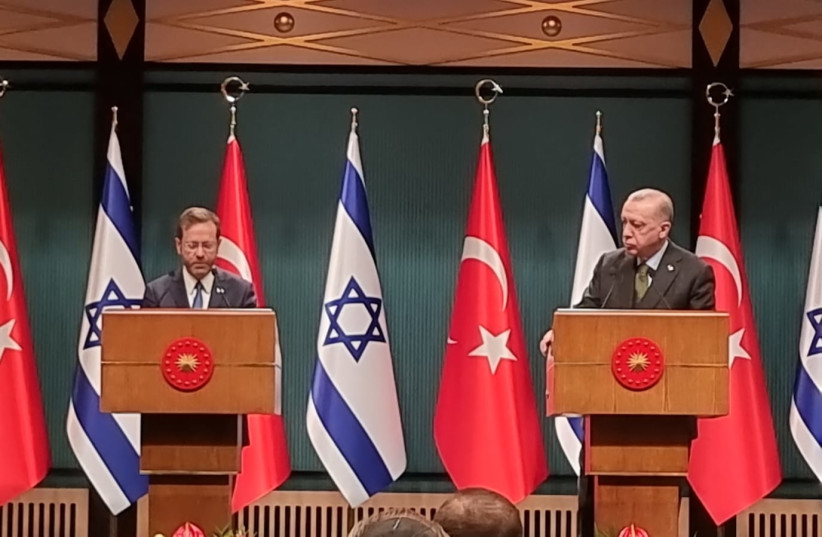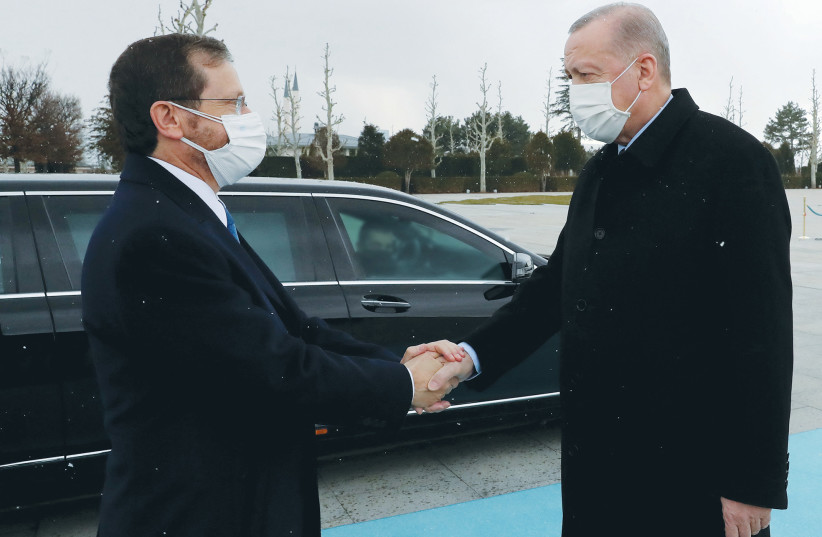Increased cooperation between Turkey and Israel could limit Russia’s influence, analysts told The Media Line, as the Israeli president finished up a two-day visit to Istanbul on Thursday.
For more stories from The Media Line go to themedialine.org
Turkish President Recep Tayyip Erdogan and his guest, Israeli President Isaac Herzog, both lauded their meeting, the highest-level visit of an Israeli official in 14 years, as a turning point in the countries’ relations.
The Turkish Presidency stated, in a video posted Thursday evening on its Twitter account, that Ankara hoped there would be a future reciprocal meeting with Herzog.
Herzog’s account thanked Erdogan for wanting to “move forward to a better future as good neighbors in our Mediterranean region.”

The meeting comes as the two countries are in similar sensitive positions regarding the war in Ukraine. Both are attempting to be mediators, and both are trying to balance siding with their Western allies in condemning the invasion, while at the same time continuing to cooperate with Moscow.
Neither country can stand up to Russia on its own, said Gabriel Mitchell, the director of undergraduate studies at the University of Notre Dame at Tanur in Jerusalem.
“But perhaps a more cooperative relationship would enable them to try to address some of their security interests in the region,” he told The Media Line.
Turkey relies on Russia for tourism, trade, and energy, with Russian imports accounting for 45% of its natural gas supply.
Mitchell said he believed cooperating on natural gas would have been a key topic for Israel and Turkey even before the war in Ukraine. “Now, that conversation is going to be even more relevant,” he said.
At a joint press conference with Herzog, Erdogan said that Ankara was ready to cooperate on energy projects. “The recent developments unfolding in our region show once again the importance of energy security,” he said.
The Turkish president added that Energy and Natural Resources Minister Fatih Dönmez would visit Israel for talks and that Ankara was aiming to increase bilateral trade.

Also at the press conference, Herzog acknowledged that the bonds between the two nations had hit a rough spot in recent years but said they “will be reshaped again and we will overcome the regional and the global challenges thanks to the easing and improving relations between our countries.”
Mitchell said the prospects of Israel and Turkey working together on a gas pipeline had become more plausible since the war in Ukraine but there were still major roadblocks.
One of the biggest hurdles would be convincing Cyprus to accept a pipeline near its territory in which Turkey, its longtime rival, is involved.
Kristian Brakel, head of the Turkey office for the Heinrich Böll Foundation, said that Israel sending Turkey natural gas would be the most logical way for the countries to cooperate.
In a message to The Media Line, Brakel said signs the two countries were working on the topic of gas “would show that things [between them] are improving substantially.”
Western countries have come under pressure to reduce their reliance on Russian gas since the invasion.
The European Union announced it was planning to reduce imports this year and Germany suspended preparations to commence service on the Nord Stream 2 pipeline that would have provided cheap Russian gas to Europe’s largest economy.
In the Black Sea, Russia could pose a threat to NATO member Turkey, where both countries have long coastlines. Syria is another flashpoint with Erdogan supporting fighters opposed to Russian-backed President Bashar al-Assad.
Erdogan is trying to thaw relations with several countries, to attract foreign investment in response to an economic crisis that has hurt his poll numbers a year before national elections.
Herzog’s visit is one of a slew of high-profile meetings in Turkey.
On Thursday, the Russian and Ukrainian foreign ministers met in the southern town of Antalya for talks, and German Chancellor Olaf Scholz is set to visit Turkey next week.
Ties between Turkey and Israel were severely strained in 2010 when nine Turkish citizens in a protest flotilla that was trying to break the blockade of Gaza died after Israeli forces raided it.
In 2018, both countries recalled their ambassadors after the US recognized Jerusalem as the capital of Israel.
Ilke Toygür, a fellow at the German Institute for International and Security Affairs who focuses on Turkey, told The Media Line that improving relations with Israel would help Ankara win points with the US.
Turkey has been trying to repair ties with Washington after years of strain, most notably due to the purchase of Russian weapons that led to Turkey being kicked out of the F-35 fighter jet program.
However, Toygür said a major breakthrough in relations with Israel is unlikely, especially since there are still major differences between the countries.
“They’re not super easy to fix with one visit,” she said, adding that the presidents’ meeting should be seen as a first step toward normalization.
Key obstacles between Ankara and Jerusalem include Turkey hosting high-level Hamas officials and Israel’s treatment of Palestinians.
On Wednesday, Erdogan said he stressed in the meeting the importance of a two-state solution and preserving the Al-Aqsa Mosque in Jerusalem. Herzog said the two sides need to deal with their disagreements with respect.
On Thursday, he visited the Neve Shalom Synagogue in Istanbul and stated on Twitter, “All Jews are connected to each other through bonds of mutual responsibility and shared fate, and the community here is an [marvelous] example of this.”
Selin Nasi, the London representative of the Ankara Policy Center, said Jews in Turkey have been supporting improved relations behind the scenes. “[When] relations sour between Turkey and Israel, often over the Palestinian issue, Turkish Jews find themselves between a rock and a harder place. … Those disappointed with Israel’s policies spew their anger at Turkish Jews as if they have any influence over Israel’s decision-making,” she wrote in an email to The Media Line.
Nasi, whose family is part of the Jewish community in Turkey, added that Herzog’s visit will help provide a diplomatic path toward normalization but that it will take time to build trust.
